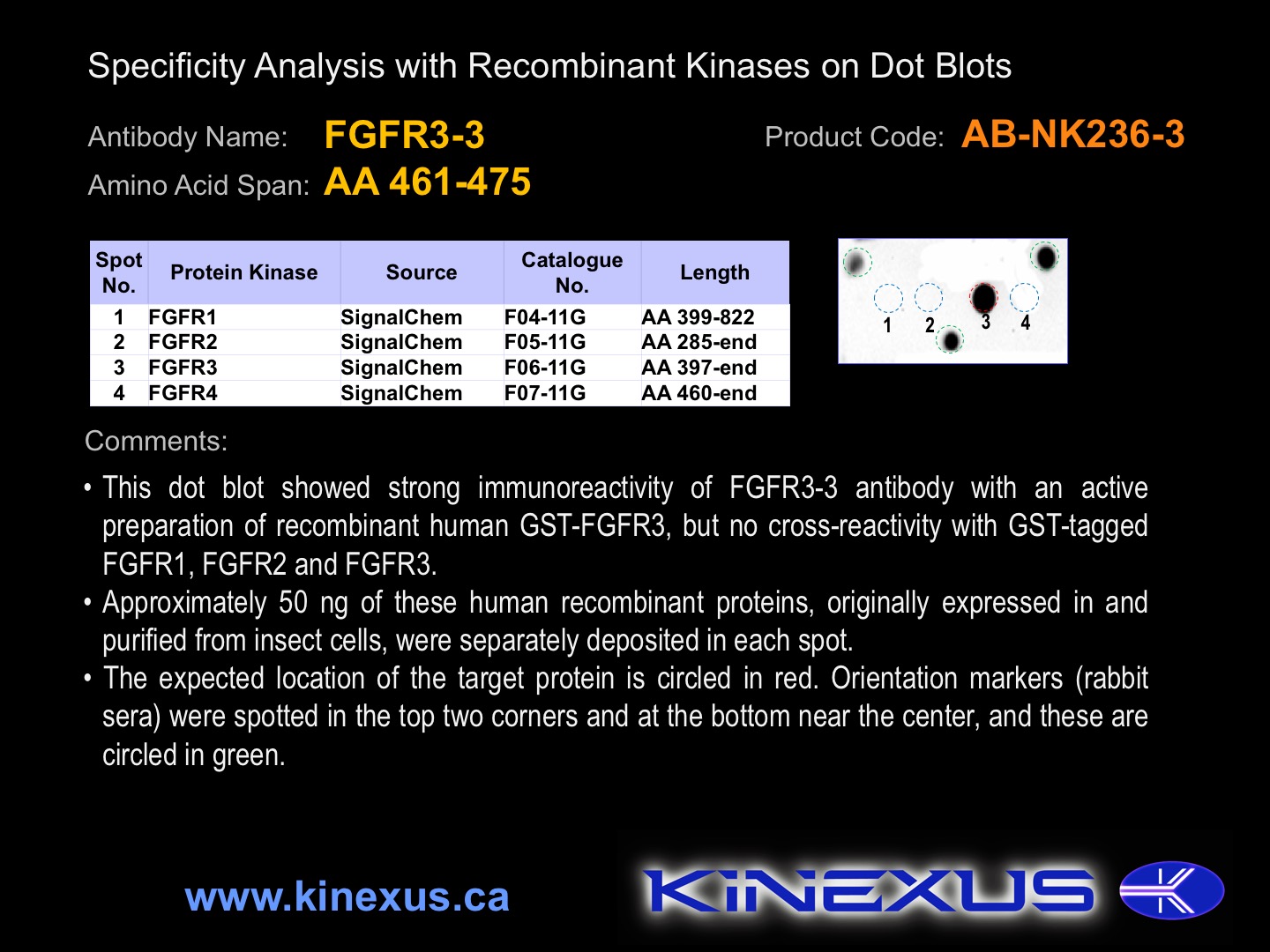Product Name: FGFR3-3
Product Number: AB-NK236-3
| Size: | 25 µg | Price: | 89.00 | |
| $US |
Target Full Name: Fibroblast growth factor receptor 3
Target Alias: ACH; CD333; CEK2; FGFR-3; Fibroblast growth factor receptor 3; Heparin-binding growth factor receptor; HSFGFR3E; JTK4; Kinase FGFR3; SAM3; CCDS3353.1; ENSG00000068078
Product Type Specific: Protein kinase pan-specific antibody
Antibody Code: NK236-3
Antibody Target Type: Pan-specific
Protein UniProt: P22607
Protein SigNET: P22607
Antibody Type: Polyclonal
Antibody Host Species: Rabbit
Antibody Immunogen Source: Human FGFR3 sequence peptide Cat. No.: PE-01ARX90
Target Alias: ACH; CD333; CEK2; FGFR-3; Fibroblast growth factor receptor 3; Heparin-binding growth factor receptor; HSFGFR3E; JTK4; Kinase FGFR3; SAM3; CCDS3353.1; ENSG00000068078
Product Type Specific: Protein kinase pan-specific antibody
Antibody Code: NK236-3
Antibody Target Type: Pan-specific
Protein UniProt: P22607
Protein SigNET: P22607
Antibody Type: Polyclonal
Antibody Host Species: Rabbit
Antibody Immunogen Source: Human FGFR3 sequence peptide Cat. No.: PE-01ARX90
Antibody Immunogen Sequence: CADPKWELSRARLTLG
Antibody Immunogen Description: Corresponds to amino acid residues A461 to G475
Production Method: The immunizing peptide was produced by solid phase synthesis on a multipep peptide synthesizer and purified by reverse-phase hplc chromatography. Purity was assessed by analytical hplc and the amino acid sequence confirmed by mass spectrometry analysis. This peptide was coupled to KLH prior to immunization into rabbits. New Zealand White rabbits were subcutaneously injected with KLH-coupled immunizing peptide every 4 weeks for 4 months. The sera from these animals was applied onto an agarose column to which the immunogen peptide was thio-linked. Antibody was eluted from the column with 0.1 M glycine, pH 2.5. Subsequently, the antibody solution was neutralized to pH 7.0 with saturated Tris.
Antibody Immunogen Description: Corresponds to amino acid residues A461 to G475
Production Method: The immunizing peptide was produced by solid phase synthesis on a multipep peptide synthesizer and purified by reverse-phase hplc chromatography. Purity was assessed by analytical hplc and the amino acid sequence confirmed by mass spectrometry analysis. This peptide was coupled to KLH prior to immunization into rabbits. New Zealand White rabbits were subcutaneously injected with KLH-coupled immunizing peptide every 4 weeks for 4 months. The sera from these animals was applied onto an agarose column to which the immunogen peptide was thio-linked. Antibody was eluted from the column with 0.1 M glycine, pH 2.5. Subsequently, the antibody solution was neutralized to pH 7.0 with saturated Tris.
Antibody Modification: Unconjugated. Contact KInexus if you are interest in having the antibody biotinylated or coupled with fluorescent dyes.
Antibody Concentration: 1 mg/ml
Storage Buffer: Phosphate buffered saline pH 7.4, 0.05% Thimerasol
Storage Conditions: For long term storage, keep frozen at -40°C or lower. Stock solution can be kept at +4°C for more than 3 months. Avoid repeated freeze-thaw cycles.
Product Use: Western blotting | Antibody microarray
Antibody Dilution Recommended: 2 µg/ml for immunoblotting
Antibody Potency: Medium-strong immunoreactivity with recombinant human FGFR3 on protein dot blots.
Antibody Species Reactivity: Human
Antibody Concentration: 1 mg/ml
Storage Buffer: Phosphate buffered saline pH 7.4, 0.05% Thimerasol
Storage Conditions: For long term storage, keep frozen at -40°C or lower. Stock solution can be kept at +4°C for more than 3 months. Avoid repeated freeze-thaw cycles.
Product Use: Western blotting | Antibody microarray
Antibody Dilution Recommended: 2 µg/ml for immunoblotting
Antibody Potency: Medium-strong immunoreactivity with recombinant human FGFR3 on protein dot blots.
Antibody Species Reactivity: Human
Antibody Positive Control: The observed molecular mass of the processed target protein on SDS-PAGE gels is reported to be around 95-100 kDa.
Antibody Specificity: High
Antibody Cross Reactivity: No immunoreactivity on protein dot blots with recombinant human FGFR1, FGFR2 and FGFR4.
Related Product 1: FGFR3-3 blocking peptide
Related Product 2: FGFR3-1 pan-specific antibody (Cat. No.: AB-NK236-1)
Related Product 3: FGFR3-2 pan-specific antibody (Cat. No.: AB-NK236-2)
Related Product 4: FGFR3-pY647+pY648 phosphosite-specific antibody (Cat. No.: AB-PK636)
Related Product 5: FGFR3-pY647+pY648 phosphosite-specific antibody (Cat. No.: AB-PK637)
Antibody Specificity: High
Antibody Cross Reactivity: No immunoreactivity on protein dot blots with recombinant human FGFR1, FGFR2 and FGFR4.
Related Product 1: FGFR3-3 blocking peptide
Related Product 2: FGFR3-1 pan-specific antibody (Cat. No.: AB-NK236-1)
Related Product 3: FGFR3-2 pan-specific antibody (Cat. No.: AB-NK236-2)
Related Product 4: FGFR3-pY647+pY648 phosphosite-specific antibody (Cat. No.: AB-PK636)
Related Product 5: FGFR3-pY647+pY648 phosphosite-specific antibody (Cat. No.: AB-PK637)
Scientific Background: FGFR3 is a protein-tyrosine kinase of the TK group and FGFR family. It serves as the cell-surface receptor for fibroblast growth factor (FGF) ligands, which induces dimerization and autophosphorylation. Phosphorylation of Y724 and Y760 increases phosphotransferase activity and induces interaction with SH2-B-beta. The FGFR3 protein plays a role in the regulation of cell proliferation, differentiation, and apoptosis. FGFR3 plays a role in several important cellular processes, including regulation of cell growth and division, determination of cell fate, formation of blood vessels, wound healing and embryo development. FGFR3 is involved in the development and maintenance of bone and brain tissue. FGFR3 has an essential role in the regulation of chondrocyte differentiation, proliferation, and apoptosis, as well as in the regulation of osteogenesis and osteoblast-mediated postnatal bone mineralization. FGFR3 expression is necessary for normal skeletal development. Activation of FGFR3 stimulates several downstream intracellular signalling cascades, including the MAPK and the Akt signalling pathways. FGFR3 is a known oncoprotein (OP). Cancer-related mutations in human tumours point to a gain of function of the protein kinase. The active form of the protein kinase normally acts to promote tumour cell proliferation. Mutations in the FGFR3 gene that result in overactive or constitutive kinase phosphotransferase activity have been associated with several cancer types as they cause aberrant cell proliferation and differentiation as well as reduced apoptosis. Mutations in FGFR3 have been implicated in causing bladder cancer, cancer of white blood cells (multiple myeloma) and cervical cancer. FGFR3 has also been linked with the development of colorectal cancer as well as dwarfism and facial and other morphogenetic disorders.
© Kinexus Bioinformatics Corporation 2017


